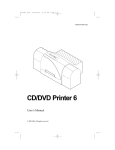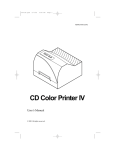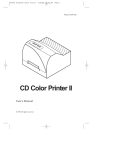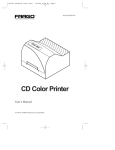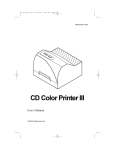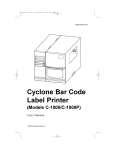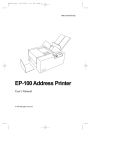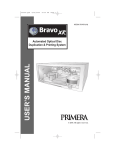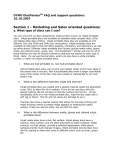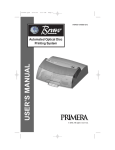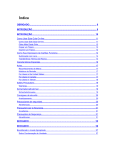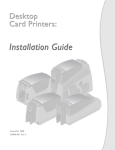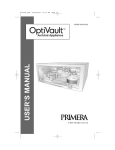Download Primera 510119 User`s manual
Transcript
510119.qxd 1/23/2004 9:11 AM Page i 012204-510119-(06) CD Color Printer Pro User’s Manual © 2001 All rights reserved. 510119.qxd 1/23/2004 9:11 AM Page ii Notices: The information in this document is subject to change without notice. NO WARRANTY OF ANY KIND IS MADE WITH REGARD TO THIS MATERIAL, INCLUDING, BUT NOT LIMITED TO, THE IMPLIED WARRANTIES OF MERCHANTABILITY AND FITNESS FOR A PARTICULAR PURPOSE. No liability is assumed for errors contained herein or for incidental or consequential damages in connection with the furnishing, performance, or use of this material. This document contains proprietary information which is protected by copyright. All rights are reserved. No part of this document may be photocopied, reproduced, or translated into another language without prior written consent. Trademark Acknowledgments: IBM is a registered trademark of International Business Machines Corporation. Windows is a trademark of Microsoft Corporation. All other trademarks are the property of their respective owners. CandelaColor® Charged by Pictographics is a registered trademark of Pictographics International Corporation. Printing History Edition 1.6, #012204, © Copyright 2001, All rights reserved. FCC Compliance Statement: This device complies with part 15 of the FCC rules. Operation is subject to the following two conditions: (1) this device may not cause harmful interference, and (2) this device must accept any interference received, including interference that may cause undesired operation. For Users in the United States: This equipment has been tested and found to comply with the limits for a Class B digital device, pursuant to Part 15 of the FCC Rules. These limits are designed to provide reasonable protection against harmful interference in a residential installation. This equipment generates, uses, and can radiate radio frequency energy and, if not installed and used in accordance with the instructions, may cause harmful interference to radio communications. However, there is no guarantee that interference will not occur in a particular installation. If this equipment does cause harmful interference to radio or television reception, which can be determined by turning the equipment off and on, the user is encouraged to try to correct the interference by one or more of the following measures: • Re-orient or relocate the receiving antenna. • Increase the separation between the equipment and receiver. • Connect the equipment into an outlet on a circuit different from that to which the receiver is connected. • Consult the dealer or an experienced radio/TV technician for help. Use of a shielded cable is required to comply with the Class B limits of Part 15 of the FCC Rules. You are cautioned that any changes or modifications not expressly approved in this manual could void your authority to operate and/or obtain warranty service for this equipment. Within the U.S., this product is intended to be supplied by a UL Listed Direct Plug-in Power Unit marked Class 2 and rated 30 Vdc, 830 mA or 1.0A. For Users in Canada: This digital apparatus does not exceed the Class B limits for radio noise for digital apparatus set out on the Radio Interference Regulations of the Canadian Department of Communications. Le present appareil numerique n’emet pas de bruits radioelectriques depassant les limites applicables aux appareils numeriques de la class B prescrites dans le Reglement sur le brouillage radioelectrique edicte par le ministere des Communications du Canada. CAUTION! TO PREVENT FIRE OR SHOCK HAZARD, DO NOT EXPOSE THE UNIT TO RAIN OR MOISTURE. TO REDUCE THE RISK OF ELECTRIC SHOCK, DO NOT REMOVE EXTERIOR PANELS. NO USERSERVICEABLE PARTS INSIDE. REFER SERVICING TO QUALIFIED SERVICE PERSONNEL. OPERATE THE UNIT WITH ONLY THE PROPER ELECTRICAL SPECIFICATIONS AS LABELED ON THE PRINTER AND AC ADAPTER ii 510119.qxd 1/23/2004 9:11 AM Page iii Read Me First! Congratulations on the purchase of your new CD Color Printer. To begin printing with your new printer immediately, please refer to the following quick start instructions. For more complete information regarding all aspects of your printer’s operation, please refer to the printer’s main User’s Manual. HARDWARE SETUP 1. Unpackage your printer, and check that the following items are included: • • • • • • • • Power Adapter Separate Power Cord (220-240V units only) Printer Software CD Color Ink Cartridge Black Ink Cartridge Cardboard CD Templates (5) Warranty Statement and Registration Card Operator’s Manual and Other Printed Information 2. Connect your printer’s power. 3. Open the front cover and install the included color and black ink cartridges by pressing the Ink Cartridge Button. The color cartridge must be installed in the left position and the black cartridge must be installed in the right position. Insert the cartridges copper-end first into the ink cartridge carrier. Then, push the top of the cartridge back until it snaps into place. When both cartridges are in place, press the Ink Cartridge Button again to reset the cartridge carrier. 4. Press the CD Tray Button, and install one of the cardboard CD templates into the CD Tray. 5. Run a self test according to the instructions in Section 2-D of the printer User’s Manual. This will ensure that both the printer and the ink cartridges are functioning properly. This procedure should also be done whenever you install a new ink cartridge or if your printer has sat for a few days without printing. If some of the nozzles do not seem to be firing, perform a clean operation after the printer iii 510119.qxd 1/23/2004 9:11 AM Page iv driver has been installed. Refer to the cleaning procedure explained within the Cartridge button description of Section 3-D in the manual to clean the cartridge nozzles. Also, you must perform a bidirectional calibration prior to printing; see the description in Section 3-D after you have installed the printer driver. 6. Connect the printer to your computer using the proper interface cable. For best results, use a IEEE 1284-Compliant cable or USB to Parallel cable, no longer than 6 feet (2 meters) in length. Do not connect to an A/B switch box. Also, note that the printer will print fastest if your computer's parallel port is set to ECP mode (most new computers are set to ECP). Your computer's manual will have information on changing the parallel port mode if you need to switch it to ECP. SOFTWARE INSTALLATION Once you have set up your printer, you must then install all of the appropriate software required for printing. The included CD contains all of the necessary software. At a minimum, you must install the printer driver appropriate for your computer’s specific operation system. Below is a description of the CD contents as well as installation instructions for each software component. CD Contents: • • CD Color Printer Pro Driver for Windows 2000/XP 2 Sample CD Designs (TIFF format) Installation Instructions: Windows 2000/XP Printer Drivers: iv 1. Insert the included CD into your computer’s CD-ROM drive. 2. Click on the Start button on the task bar, then click on Printers and Fax in WindowsXP, or Printer in Windows 2000. 510119.qxd 1/23/2004 9:11 AM Page v 3. Double-click on the Add Printer icon. This will launch the Add Printer Wizard. Click Next, then click Next again. 4. Click the Have Disk button. 5. Click Browse, select your CD-ROM drive. 6. For Windows Windows 2000/XP, open the Win2000-XP folder and select the file named OEMSETUP.INF. v 510119pdf.qxd 5/28/2002 4:53 PM Page vi Please Note To fully utilize CD Color Printer Pros high-speed printing, you must set your PC parallel printer port to the ECP setting. Otherwise, you may find that print speed is up to 50% slower than you might expect. Please refer to your computer systems documentation for instructions on enabling ECP. It is almost always found in the CMOS settings which are entered upon power-up. If you have questions on this, contact your PCs Technical Support Group. Interactive Feature in this PDF Document There are interactive features that will allow you to jump to different locations within the document. Each listing in the Table of Contents is interactive. Place the cursor on either the words or the page number. A small hand with a pointing finger icon appears. Click on the line with the icon and the document will jump to that page. If you want to return to the Table of Contents, move the icon to the top of the page and click on the arrow marked TOC. Navigating through the Index is similar. Place the icon on one of the listings or page numbers, click on it, and it will move to that page. The text relating to the Index listing will appear in red. Returning to the Index can be done by clicking on the arrow marked Index. vi 510119.qxd 1/23/2004 9:11 AM Page vii INDEX Table of Contents Section 1: Getting Started A. Choosing a Good Location...............................................................................1 B. Unpacking and Inspection ...............................................................................1 C. Identifying the Parts..........................................................................................2 D. Applying Power.................................................................................................3 Section 2: Ink Cartridges and Printable CDs A. About Ink Cartridges and Printable CDs ......................................................4 B. Installing an Ink Cartridge ..............................................................................4 C. Loading Blank CD Media.................................................................................6 D. Printing a Self Test .............................................................................................7 E. Replacing or Switching Ink Cartridges ..........................................................8 Section 3: Using the CD Color Printer Pro with Windows A. Connecting the Printer to Your Computer ..................................................11 B. Installing the Printer Driver...........................................................................12 C. Setting Up the Printer Driver ........................................................................15 D. Printing a CD....................................................................................................23 E. Creating a Print File (*.prn)............................................................................24 F. Creating PRN Files in SureThing CD Labeler.............................................25 Section 4: Interpreting the Printer Indicator Lights...............................................26 Section 5: Maintaining the Printer A. Cleaning the Ink Cartridge Nozzles .............................................................28 B. Cleaning the CD Tray and Printer Casing ...................................................28 C. Clearing a CD Media Jam ..............................................................................28 D. Technical Support ............................................................................................28 Section 6: Technical Specifications ...........................................................................29 Appendix A: Interfacing Information A. Introduction......................................................................................................30 B. 6-Pin Minicircular Auxiliary Interface .........................................................31 Index ................................................................................................................................32 vii 510119.qxd viii 1/23/2004 9:11 AM Page viii 510119.qxd 1/23/2004 9:11 AM Page 1 TOC INDEX Section 1: Getting Started THANK YOU… ...for choosing the CD Color Printer Pro. This printer is the perfect way for you to label all of your custom CDs quickly, easily, and with a touch of class. The CD Color Printer Pro lets you print razor-sharp text, vibrant spot colors, and even stunning photo-realistic photographs directly onto the surface of printable CDs. Operation is simple, quality is high, and printed images are durable and highly smudge-resistant. To begin using the printer, please refer to the remainder of this manual. This User’s Manual is your complete step-by-step guide to quickly and easily setting up and printing with your new CD Color Printer! A. CHOOSING A GOOD LOCATION • • • Place the printer in a location with adequate air circulation to prevent internal heat build up. Do not place the printer near heat sources such as radiators or air ducts, or in a place subject to direct sun-light, excessive dust, mechanical vibration or shock. Allow for adequate clearance in front of the printer to accommodate the length of the unit with its CD Tray open. B. UNPACKING AND INSPECTION While unpacking your printer, inspect the carton to ensure that no damage has occurred during shipping. Make sure that all supplied accessories are included with your unit. The following items should be included: • Printer • PowerAdapter • Separate Power Cord (220-240 VAC units only) • Printer Software CD • Color Ink Cartridge, Reorder #53321 • Black Ink Cartridge, Reorder #53319 • Cardboard CD Templates (5) • Warranty Statement and Registration Card • This manual and other printed information Save the carton and packing materials. They will come in handy when transporting the printer. Getting Started 1 510119.qxd 1/23/2004 9:11 AM Page 2 TOC INDEX C. IDENTIFYING THE PARTS This illustration shows the extended CD Tray and all of the control buttons and LED indicator lights found on the printer. Power Button Power Light Busy Light CD Tray Button Ink Cartridge Button Front Cover CD Tray The Power Button turns the printer’s power ON and OFF. This button also serves to cancel the current print job if a print error occurs and to reset the printer for the next print job. The CD Tray Button opens or closes the CD Tray for loading and ejecting CDs. The Ink Cartridge Button positions the Cartridge Carrier for easy ink cartridge replacement. The Power Light indicates that power is ON. The Busy Light indicates that the printer is printing, processing, or is in some way busy. Both of these lights can also indicate several other printer conditions. For complete information on these lights, please refer to Section 6. 2 Getting Started 510119.qxd 1/23/2004 9:11 AM TOC Page 3 INDEX This illustration shows the input ports found on the rear panel of the printer. Both a parallel and a serial interface port are provided. If using the printer with Windows, you will use its Parallel Interface Port. Note that the printer’s auxiliary port is for use with auto loaders and automatic duplicators only, which are sold separately. For more information on each of the interface ports, please refer to Appendix A. Auxiliary Port Power Port Parallel Interface Port D. APPLYING POWER 1. Locate the power adapter supplied with your printer. 2. Place one end of the adapter cord into the power port on the rear panel of the printer. 3. Plug the power cord of the adapter into an available wall outlet. Once the power cord is connected, the printer will automatically turn ON. Getting Started 3 510119.qxd 1/23/2004 9:11 AM Page 4 TOC INDEX Section 2: Ink Cartridges and Printable CDs A. ABOUT INK CARTRIDGES AND PRINTABLE CDS For full-color printing, a 3-color ink cartridge is available. This cartridge contains the three process-color inks of yellow, magenta, and cyan, which combine to produce up to 16.7 million printable colors. A monochrome ink cartridge is also available for fast, inexpensive black-and-white printing or can be used with the 3-color cartridge for 4-color CMYK printing. With both of these ink cartridges, you can print directly onto virtually any brand of printable-surface CD media. Since different brands of CDs have different printable coatings, however, you may need to adjust the printer driver settings to accommodate your specific brand of CD media. Refer to Section 3 for further printer driver information. Due to the wide variety of printable-surface CD media, you may find that certain brands of CDs provide higher print quality than others. For maximum print quality, use CD media authorized by the printer manufacturer. Contact your local CD Color Printer reseller or contact the printer manufacturer directly for selection and pricing on all printer supplies and accessories. B. INSTALLING THE INK CARTRIDGES 1. With the CD Tray closed, open the printer’s front cover by pulling down on its top-left corner. 4 Ink Cartridges and Printable CDs 510119.qxd 1/23/2004 9:11 AM Page 5 TOC INDEX 2. Remove the color ink cartridge from its packaging. 3. Slowly remove the tape covering the cartridge’s printhead, being careful to avoid damaging or removing the barcode label on the underside of the cartridge. DO NOT TOUCH THE COPPER AREA! 4. Press and release the Ink Cartridge button to move the carrier to the load position. 5. Insert the color ink cartridge into the left cartridge carrier position, copper end first. 6. Push the cartridge back until it snaps into place. 7. Repeat steps 2 through 6 for the black cartridge, placing it in the right cartridge carrier position. 8. Close the printer’s front cover. If you leave the door open, ambient light can interfere with proper cartridge initialization. 9. Press and release the the cartridge carrier. Ink Cartridge button again to reset NOTE: When changing to subsequent new cartridges, refer to Section E. Ink Cartridges and Printable CDs 5 510119.qxd 1/23/2004 9:11 AM Page 6 TOC INDEX C. LOADING BLANK CD MEDIA The CD Color Printer Pro is capable of printing onto a variety of CD related media including printable CDs and DVDs, and cardboard CD templates. Each of these items is loaded one at a time, before the start of each print job. Loading a Blank CD 1. With the printer’s front cover shut, press and release the CD Tray button. 2. Once the CD Tray is fully extended, place the blank CD onto the tray with the printable side facing upward. Handle the CD only along its edges and DO NOT touch its printable surface. 3. Press and release the CD Tray button to close the CD Tray. If you wish, you may also leave the CD Tray open and it will automatically close at the start of the print job. Once the CD has been printed, the CD Tray will automatically re-open so the next blank CD can be loaded (if Manual Load is selected in the printer driver then you must press the CD Tray button to manually open and close the tray). NOTE: Blank Cardboard CD templates are available for printing inexpensive test prints and can be printed on both sides. Load in the exact same fashion as an actual CD. Make sure the template is flat to avoid the cartridges from rubbing on the surface; flatten the template if necessary. 6 Ink Cartridges and Printable CDs 510119.qxd 1/23/2004 9:11 AM Page 7 TOC INDEX D. PRINTING A SELF TEST Now that the printer is set up and print supplies are loaded, a self test should be performed to check for proper operation of the printer. A sample of the self test print is shown below. Refer to the following steps to run a self test: 1. If power is ON, turn it OFF now using the Power button. The Power light should be OFF. Verify that print supplies are installed and that the CD Tray is closed. 2. With the printer’s front cover shut, press and hold the CD Tray button as you turn the printer power ON. 3. Continue to hold the CD Tray button down for a few seconds, until you hear the self test begin to print. Ink Cartridges and Printable CDs 7 510119.qxd 1/23/2004 9:11 AM Page 8 TOC INDEX E. REPLACING OR SWITCHING INK CARTRIDGES Once you begin using your CD Color Printer Pro on a regular basis, you will eventually need to replace an empty ink cartridge. Please refer to the following steps: 1. With the CD Tray closed, open the printer’s front cover by pulling down on its top-left corner. 2. If installing a new, replacement ink cartridge, slowly remove the tape covering the cartridge’s printhead, being careful to avoid damaging or removing the barcode label on the underside of the cartridge. DO NOT TOUCH THE COPPER AREA! 3. From within the printer driver setup window, click on the Cartridge button and then on the Change button to move the carrier to the load position. Note that the printer driver must be installed and that the printer must be connected to your computer (see Section 3) in order to complete this step. If you prefer, you may instead press the Ink Cartridge button on the top of the printer. 8 Ink Cartridges and Printable CDs 510119.qxd 1/23/2004 9:11 AM Page 9 TOC INDEX 4. Remove the installed ink cartridge by grasping the top of the cartridge and firmly pulling it straight toward you. You will hear the cartridge snap out of position. Remove it from the printer. 5. Insert the replacement or alternate ink cartridge into the cartridge carrier, copper-end first. 6. Push the cartridge back until it snaps into place. 7. Close the printer’s front cover. 8. Go back to the printer driver setup window and click on either the New Color Cartridge, New Black Cartridge, or Used Cartridge button to indicate whether you installed a fresh, new cartridge or simply switched between a previously used cartridge. The cartridge carrier will return to its home position. See Section 3-D for more information on these buttons. Ink Cartridges and Printable CDs 9 510119.qxd 1/23/2004 9:11 AM Page 10 TOC INDEX Alternately, you may use the Ink Cartridge button; to indicate a previously used cartridge simply press the button and release quickly. If you have installed a fresh new cartridge, press and hold the button until the cartridge returns to its home position. The two LED’s will then blink on and off simultaneously. If you’ve installed a new color cartridge, press the Power button; if you’ve installed a new black cartridge press the Ink Cartridge button again. NOTE: When you choose New Cartridge, the ink levels are cleared and the ink level counter will go back to full capacity (for either color or monochrome). If you use the Ink Cartridge button, the ink levels are cleared by pressing and holding the button until the two green LED’s flash and the cartridge returns to its home position (you must then press the Power button to clear the color ink levels or press the Ink Cartridge button to clear the black ink levels). NOTE: The ink cartridges you use with your printer may require periodic general maintenance to ensure optimal print quality. If your prints show banding or lines through the image, left to right on the printed disc, you should clean the ink cartridge as described in your User's Manual. Please note that it may take more than one cleaning to unclog the tiny nozzles that make up the ink cartridge's print head. If the cleaning process as described in the manual does not improve print quality, moisten a cloth with isopropyl alcohol and gently dab the brass colored tip of the cartridge until clean of any dried ink until you get smooth ink flow from all three colors. The moisture helps to draw the ink out of the cartridge. It is very important to blot the cartridge very gently; wiping or scrubbing the print head could easily damage the cartridge. 10 Ink Cartridges and Printable CDs 510119.qxd 1/23/2004 TOC 9:11 AM Page 11 INDEX Section 3: Using the CD Color Printer Pro with Windows A. CONNECTING THE PRINTER TO YOUR COMPUTER The CD Color Printer Pro is designed to be used with nearly any IBM-PC® or compatible running Windows 2000/XP. The printer is equipped with a standard 8-bit Centronics-type parallel port. This port is the means through which it receives data from your computer. To connect the printer to your computer, obtain a shielded, bi-directional parallel cable, and refer to the following steps: NOTE: It is highly recommended you use a fully shielded IEEE 1284 compliant parallel cable under 10 feet in length. For faster printing, your computer’s parallel port mode should be set to ECP. If you experience problems with this setting or if your computer’s parallel port is not ECP compatible, set your computer’s parallel port to the standard output only “Printer Port” setting. Refer to your computer’s system documentation for instructions on checking and/or changing the parallel port mode. 1. Connect the Centronics-type parallel side of the cable to the printer. Snap the fastening clips into place. 2. Connect the other side to the back of your computer at LPT1, LPT2, or the PARALLEL connector. Using the CD Color Printer Pro with Windows 11 510119.qxd 1/23/2004 9:11 AM Page 12 TOC INDEX The printer must have its Power light illuminated to receive data. If the light is not on, press the Power button. B. INSTALLING THE PRINTER DRIVER The CD Color Printer Pro can be used with virtually any Windows application program. This is accomplished by installing in Windows what is called a “printer driver.” The printer driver is simply software which gives the printer all the information needed for printing. Use the following steps to install the printer driver. NOTE: This section of the Operator’s Manual assumes that you are already familiar with Windows and know how it operates. If you are not yet familiar with Windows, consult the appropriate Microsoft documentation to become familiar with the basics of Windows before proceeding. To install the printer driver into Windows 2000/XP, refer to the following: 1. Insert the included CD into your computer’s CD-ROM drive. 2. Click the Start button, point to Settings, and select Printers. 12 Using the CD Color Printer Pro with Windows 510119.qxd 1/23/2004 9:11 AM Page 13 TOC INDEX 3. Double-click on the Add Printer icon. This will launch the Add Printer Wizard. Click Next, then click Next again. 4. Click the Have Disk button. 5. Click Browse, select your CD-ROM drive. 6. For Windows XP and Windows 2000, open the Win2000-XP folder and select the file named OEMSETUP.INF. Follow the on-screen instructions to complete installation. 7. When installing on Windows 2000 or XP, you will be prompted with a dialog box like the one shown here: Color CD Printers do not have a Microsoft digital signature; you can simply click Continue Anyway to complete the installation. If your system will not allow you to continue, it is possible your network administrator has configured the system in a way that does not allow you to install devices that do not have a Microsoft digital signature. In this case, consult your system administrator. Using the CD Color Printer Pro with Windows 13 510119.qxd 1/23/2004 9:11 AM Page 14 TOC 8. INDEX Once installed, the “CD Color Printer Pro” icon will appear in the Printer’s folder: IMPORTANT! During installation of the Windows 2000/XPdriver you must de-select (uncheck) the check box “Automatically detect and install my plug and play printer”. NOTE: Before installing updated printer driver versions, always delete the existing printer driver version from your system. To do this, simply select the printer driver icon from within the Printers folder, and press the Delete key. After installing the new printer driver you will need to re-boot if you are using Windows XP. 14 Using the CD Color Printer Pro with Windows 510119.qxd 1/23/2004 9:11 AM Page 15 TOC INDEX C. SETTING UP THE PRINTER DRIVER Once the printer driver has been successfully installed, you will need to set the driver up with the appropriate print options. Refer to the following steps to change or verify your printer driver options: 1. Click the Start button, then click Printers and Faxes. Right click on the CD Color Printer PRO Icon and select Printing Preferences. 2. In Windows 98/Me, you will see several tabs from which printer settings can be changed including Media, Device Options, Cartridge, and Calibrate. In Windows 2000/XP click on the Advanced button for more driver settings. Using the CD Color Printer Pro with Windows 15 510119.qxd 1/23/2004 9:11 AM Page 16 TOC INDEX NOTE: Most applications allow you to change these same printer driver options from their “Print” and/or “Printer Setup” screens. This means that you don’t have to go back to the main printer setup window each time you want to change a setting or option in the printer driver. These applications will usually give you the same choices and options, but in a slightly altered format. Most applications do not save your printer driver option changes, but instead only use your changes for the current image. 3. Media In Windows 2000/XP the Layout and Paper/Quality tabs appear; the Advanced button contains more printer driver settings. Although each printer driver displays the print options in a slightly different format, the basic options are the same. Refer to the remainder of this section for a description of each printer driver option. The media option will be set to CD for printing onto printable surface CDs, DVDs, and cardboard template CDs. When sizing your images for printing, keep in mind that CD media has the following maximum printable area: 4.567” round (116mm). In the drop down Media Type menu you can also select Custom, which allows you to increase or decrease your imaging area with maximum CD diameter of 4.724” (120 mm). Ink Cartridge Select Monochrome Black for black and white prints using the black cartridge only. Select Color for the fastest full color prints. Select Color + Black for 4-color CMYK prints. Print Quality Select the appropriate print quality option for your image. Keep in mind that Fast 600 provides the lowest quality but fastest print, and that Super Photo 2400 provides the highest quality but slowest print. You may wish to experiment with these options to see which one is best for your particular CD media and print quality parameters. Dither Mode Select this option to choose the appropriate dither mode for your image. Select Optimize for photos if printing a design primarily composed of photographic images. Select Optimize for graphics if mainly printing text, lines, and graphics. 16 Using the CD Color Printer Pro with Windows 510119.qxd 1/23/2004 9:11 AM TOC Page 17 INDEX Color Matching Click on the Color Matching down arrow and choose the color matching option that’s right for you. Select None if you are more interested in processing speed rather than color accuracy, if you have already color corrected your image for printing, or if you are using some other third party color matching software. Select Algebraic if you would like the printer driver to make very simple color balance adjustments based on an RGB color model. This option gives you more natural looking images without actually utilizing any specific color matching software. Select PrimaColor to enable color matching profiles written specifically for the CD Color Printer Pro. The PrimaColor by Candela Color Management System automatically adjusts the color of your image according to preconfigured printer profiles and default system profiles. This results in a very precise color match compliant with ICC standards. Note that the color of the CD surface can affect the outcome of the colors and PrimaColor is optimized for white TuffCoat CD’s. Ink Saturation This option controls the ink saturation of the printed image. When printing onto the printer manufacturer’s TuffCoat CD media, this option can be left at its default setting of 50%. When printing onto other brands of printable CD media, you may need to adjust this control in order to optimize the ink saturation for the printable surface of your specific CD media. Click and drag on the slide’s box, or click on the left and right arrows to change the ink saturation setting. Moving the slide’s box to the left reduces the overall ink saturation, while moving it to the right increases it. Manual Load Select this option when you are printing multiple copies of a single design or if using an auto-loader. If you do not select this option when printing multiple copies, the printer has no way of knowing whether or not you have loaded a blank CD and will print each of the selected number of copies onto the same CD. When this option is selected, you must press the CD Tray button after each new CD blank is loaded Using the CD Color Printer Pro with Windows 17 510119.qxd 1/23/2004 9:12 AM Page 18 TOC INDEX (unless using an autoloader). This will close the CD Tray and let the printer know that a fresh CD is installed and ready to be printed. Black Text With Black Cartridge Only Select this option to print black text using the black cartridge only. This option only is used for CMYK printing to force black text to print with black only instead of CMYK. Cartridge Select this button to display the ink cartridges currently installed, their current ink levels, as well as options for cleaning and changing a cartridge. Select the Clean button to send a simple test print pattern to the printer. Be sure to have a CD or CD template installed. This test print pattern purges the ink cartridge nozzles and lets you know if any one of the Yellow, Magenta, Cyan, or Black nozzles is clogged. If one of these colors does not have both top and bottom horizontal lines or has an incompleted diagonal line on the test print, repeat the cleaning procedure. If nozzles still appear to be clogged, remove the cartridge and gently wipe the nozzle area sideways with a clean water-dampened cloth. If after several cleanings a color still does not appear on the test print, the cartridge may be damaged or empty and may need to be replaced. 18 Using the CD Color Printer Pro with Windows 510119.qxd 1/23/2004 9:12 AM Page 19 TOC INDEX Purge Area Incomplete Diagonal Line Missing Horizontal Line Nozzle Test Areas Purge Area Incomplete Diagonal Line Each color should have two horizontal lines and should have a continuous diagonal line between. Notice in the example shown, the black nozzle test area has a missing top horizontal line and the diagonal line is not continuous; the cyan nozzle test area does not have a continuous diagonal line. Select the Change button to install a fresh, new ink cartridge or to switch back and forth between a previously used cartridge. After the cartridge has been replaced according to the instructions in Section 2-E, select either the New Color Cartridge or New Black Cartridge button or the Used Cartridge button accordingly. These selections are necessary for the printer to accurately keep track of ink cartridge ink levels. Using the CD Color Printer Pro with Windows 19 510119.qxd 1/23/2004 9:12 AM Page 20 TOC INDEX Calibrate This section displays options for fine-tuning the position of your printed image, changing the size of a CD’s nonprintable center, and also performing a bi-directional calibration. The following gives a complete description of each of the Calibration options. The Center Size adjustment enlarges the non-printable center if a positive number is entered and reduces its size if a negative number is entered. As a rule, an adjustment of 12 pixels is equivalent to approximately 1 millimeter. For printing on CD’s you should always keep the Clip Outer Circle and Clip Inner Circle checked or enabled. 20 Using the CD Color Printer Pro with Windows 510119.qxd 1/23/2004 TOC 9:12 AM Page 21 INDEX The Bi-di Calibration Print button will perform a test print to calibrate the bi-directional printing and also the color-to-black offset values. Place a CD in the printer tray before clicking on this button. Your print should look something like this: After the test print completes enter the numbers which match best to complete the calibration. The Enable bi-di printing check box enables bi-directional printing for the fastest throughput. When checked (enabled) it is important to perform a Bi-di Calibration every time a new cartridge is installed. For slower uni-directional printing uncheck (disable) the Enable bi-di printing check box; in this case a Bi-di Calibration is not necessary. Note that your printer comes from the factory pre-calibrated to print the image in the center of the CD. You can use the Centering Test Print option if you need to fine-tune this location. Using the CD Color Printer Pro with Windows 21 510119.qxd 1/23/2004 9:12 AM Page 22 TOC INDEX To do this, refer to the following steps: 1. Verify that a CD tray is installed in the printer. Also, verify that the printer is powered ON and that it is connected to your computer. (Do not use a cardboard CD template for best accuracy). 2. Click on the Centering Test Print button of the Image Placement box within the Calibration window. The printer will begin printing the calibration test print. 3. When the print is complete, rotate the CD 180 in the CD Tray and repeat step 2 using the same CD. 4. When the second run of the print is compete, you should have a test print that looks like the following: 5. Along the Vertical axis of the printed CD template, find the number whose lines touch. For example, in the above illustration, the number would be 0. Enter that number into the Vertical box of the Calibration window. Repeat this same step for the Horizontal axis. In the above illustration this number would be 0. 6. Select the OK button. The numbers you entered will be sent and stored inside the printer’s memory. Your images should now reflect any changes you made. Note that the numbers always are shown as 0,0 initially and these values sent are added to or subracted from the currently stored offsets. o 22 Using the CD Color Printer Pro with Windows 510119.qxd 1/23/2004 9:12 AM TOC Page 23 INDEX D. PRINTING A CD Now that you have hooked up the printer, loaded the print supplies, and installed the printer driver, you are ready to print your first CD. Follow these steps to print your first image: 1. Go to your favorite graphics application program. Or, install and open the Windows CD creation software included with your printer. 2. Open or create the image file you wish to print. If using a program other than the included Windows CD creation software, you will need to create a custom page or canvas size in your program according to the type of label you intend to create. The following tips will help you do this: • If creating a label for a CD, set your page size to 4.567” x 4.567” (116 x 116mm). Although your image will appear square on screen, the printer driver will automatically crop your image to the round shape of a CD for printing. The driver will also automatically crop out the center 1.73” (44mm) of your image to accommodate a CD’s non-printable center hub (more or less if you change the center size in the Calibration tab). If you would like to better visualize where the round outside edge and the round non-printable center of a CD will fall in relation to your image, simply draw one circle with a 4.567” (116mm) diameter and another with a 1.73” (44mm) diameter. Then, center both circles within your active page or canvas area. These circles will serve as a guide while designing your image. Be sure to delete these circles before printing. 3. Once you have created your image and are ready to print, select Print Setup (or the equivalent) from the program’s File menu to verify that the printer driver settings are correct for your image. Be sure the proper Ink Cartridge options are selected according to the supplies you have installed in the printer. Once the driver is set, select Print from the program’s File menu. 4. The printer driver will then begin to process the image. Depending upon the size of the image and the processing speed of your computer, processing time can take from several seconds to a minute or so. Using the CD Color Printer Pro with Windows 23 510119.qxd 1/23/2004 9:12 AM Page 24 TOC 5. INDEX Once processing is complete, the printer will begin to print. Print time will vary depending on whether you are printing with color or monochrome cartridges and on which Print Quality setting you selected. When printing is complete, the CD Tray will automatically open and remain fully extended until the next print job is received. E. CREATING A PRINT FILE (*.PRN) If you are using the CD Color Printer with a duplication system, it may be necessary to print your image to a *.PRN file on your hard drive. This is also useful for a print job that doesn't change and has to be printed often. This is because a print (*.PRN) file contains the bit-for-bit information that is to be printed to the disc surface. A print file is created in most applications by selecting a Print to File option in the Print Dialog Window. If your application does not have a Print to File option, you must change the printing port under the printer properties to set it to File rather than a LPT or USB port. This is done as follows: 1. Click the Start button, point to Settings, and select Printers. 2. Right-click the CD Color Printer icon from the Printers Folder and select properties. 3. Select the ports tab and select the "File" option. You are now ready to create a print file. First, make certain you have your driver properties (i.e. cartridge type, print resolution, color matching, etc) set the way you want them. Please note that a print file has all driver settings built into that file at the time of creation. Once this file is created it cannot be changed. For example, if a print file was created with the cartridge type set to color, you can only print using a color cartridge. If you change to a monochrome cartridge, the print file will not work. You would have to recreate the print file with the driver properties set to monochrome in order for it to work properly. Also, you will need to disable the 32 Print Spooler and Write Direct to Port options in order to create a print file; these are options to control data flow through a parallel port and do not apply to saving files to a hard drive. 24 Using the CD Color Printer Pro with Windows 510119.qxd 1/23/2004 9:12 AM Page 25 TOC INDEX Once you are confident of your driver settings, simply click Print. When using Windows 2000 or XP you will be prompted for the name, but not the destination path. The file destination is determined by your operating system. To find the file after it is created, simply search for that file using the Find File feature found on the Start Menu. Each time a file is created it should be saved in this location. It does ne matter where you save the file to, but you will want to name the file with the PRN file extension or it may not work properly. F. CREATING PRN FILES IN SURETHING CD LABELER Printing to a file is a good way to spool a print file for use with automated duplication. a. Open up SureThing CD Labeler b. Create or Open up an already created file. c. Go to File on the menu bar. d. Select Print. e. Select the Advanced button at the bottom left corner of the print window. f. Check the Print to File check box and select OK g. Select OK to print. h. When prompted to provide an Output Filename, type in a name that you want to give the PRN file (ex. test.prn). Make sure to type in the extension .prn when creating the output file. If you want to directly specify where you want to save the PRN file, you may directly specify it at this time (ex. C:\My Documents\test.prn). If you do not provide a path, the file will most likely be copied to the, My Documents folder. If not, you may search for it using the Search feature from your Start menu. Please Note: If you wish to print directly from SureThing, you will need to disable Print to File in the Advanced options. Using the CD Color Printer Pro with Windows 25 510119.qxd 1/23/2004 9:12 AM Page 26 TOC INDEX Section 4: Interpreting the Printer’s Indicator Lights The Power and Busy LED indicator lights located on the top of the printer can tell you a lot about what is happening inside the printer. To accurately interpret what it means when these lights are on, off, or flashing, please refer to the following: Busy Light Power Light Power Light Busy Light Printer on solid off Is ready to receive a print job. on solid on solid Is processing and printing an image. on solid blinking slowly Has received a print job and is waiting for you to load CD media or has a print media jam. If media loading is required, simply load media into the CD Tray according to Section 2-C and press the CD Tray button to resume printing. If print media is jammed, clear the media from the printer and turn the printer OFF and ON to reset for the next print job. both lights are blinking alternately with each other Waiting for a cartridge to be installed and the Ink Cartridge button to be pressed. See Section 2-B or 2-E for more information on changing or replacing ink cartridges. on solid flashing rapidly The tray or the carrier has stalled. Turn the unit OFF and ON again. You may need to clear an obstruction such as a jammed disc. 26 Interpreting the Printer’s Indicator Lights 510119.qxd 1/23/2004 9:12 AM Page 27 TOC Power Light flashing rapidly INDEX Busy Light on solid Printer Cartridge Problem. Either the wrong cartridge or no cartridge is installed. If the proper cartridge is installed, but the error continues, the printer may not be able to properly detect the cartridge. There is a multi-colored barcode label on the bottom of the ink cartridge which the printer uses to identify the cartidge. If this label is damaged, the cartridge may not be detected properly. Both lights are flashing at the same time rapidly and the printer has paused. Ink Low Warning. You can either replace the cartridge now (see Section 2-B or 2-E) or you can press the CD Tray button to continue printing. Note: If you do replace the cartridge now then the ink levels will be cleared. (It assumes you replaced with a fresh cartridge.) If you instead press the CD Tray button to continue then the ink levels will not be cleared and you will not be warned again until a new cartridge is installed. Both lights are blinking at the same time in this sequence: five blinks, pause, repeat . . . Waiting for you to specify if you’ve installed a new COLOR Cartridge or a new Black Cartridge. Press the Power button to specify a new COLOR Cartridge or press the Ink Cartridge button to specify a new Black Cartridge. You will get to this point by first pressing the Ink Cartridge button, installing a new cartridge and then pressing and holding the ink cartridge button. See Section 2-E for more details. Interpreting the Printer’s Indicator Lights 27 510119.qxd 1/23/2004 9:12 AM Page 28 TOC INDEX Section 5: Maintaining the Printer The CD Color Printer Pro is designed to require very little maintenance. Nevertheless, there are a few procedures you can perform on a regular basis or as needed to ensure your printer’s best performance. A. CLEANING THE INK CARTRIDGE NOZZLES It may be necessary to clean the ink cartridge nozzles if the printer does not seem to be laying down ink evenly or if you suspect an ink cartridge nozzle has become slightly dried out or clogged. Refer to the cleaning procedure explained within the Cartridge button description of Section 3-D to clean the cartridge nozzles. B. CLEANING THE CD TRAY AND PRINTER CASING If ink gets on the printer’s CD Tray, it may stain if left on the tray too long. To avoid this, simply wipe off any ink from the CD Tray as soon as you notice it. Use a lint-free cloth slightly moistened with water to wipe off the CD Tray. If necessary, use these same items to wipe off the outside casing of the printer. Always disconnect your printer’s power cord before cleaning. Resume printer operation only after the printer is completely dry. C. CLEARING A CD MEDIA JAM If CD Media becomes jammed inside the printer, first press the CD Tray button to try and eject the media. If this does not work, turn the printer power OFF and gently try to clear or remove the CD media manually. D. TECHNICAL SUPPORT If you have difficulty operating your CD Color Printer Pro, the procedures in this manual should, in most cases, solve the problem. If you still have difficulty, contact the technical support number listed on the insert included in the supply pack. 28 Maintaining the Printer 510119.qxd 1/23/2004 9:12 AM Page 29 TOC INDEX Section 6: Technical Specifications Model: Print Method: CD Color Printer Pro Ink-Jet Printing Resolution: 2400 x 1200 dpi, 1200 x 1200 dpi, 600 x 600 dpi, or 600 x 300 dpi (driver selectable) Depends upon percentage of coverage and print mode selected: Print Speed: About 111 seconds for 100%, full-color coverage, Photo 2400 About 60 seconds for 100%, full-color coverage, Presentation 1200 (default) About 51 seconds for 100%, full-color coverage, Best 600 About 34 seconds for 100%, full-color coverage, Normal 600 About16 seconds for 100%, full-color coverage, Fast 600 About 2 seconds for 15% coverage, black monochrome, Fast 600. Colors: 16.7 million with black monochrome Ink Types: Dual-cartridge 3-Color (C, M, Y) and black monochrome (K) Color Matching: PrimaColorTM color matching software included Media Types: Printable-surface 120mm CD-R or DVD-R; also supports 58mm x 86mm printable-surface business card CDs with optional adapter kit (sold separately) Printer Drivers: Windows 2000/XP Data Interfaces: Centronics-type parallel; also works with most USB to Parallel cables for USB-only PCs Minimum System Requirements: Pentium®-class computer or better, 64MB RAM, 100MB free hard drive space Control Interface: TTL-level signals for busy printing, tray open/close, etc.; available on rear-panel 6-pin mini-DIN connector Label Editing Software: SureThingTM First Edition Software for Windows included Maximum Print Width: 4.72” (120 mm) Electrical Ratings: 30 VDC, 0.8A Adapter Types: 100 VAC, 120-127 VAC, 220-240 VAC Certifications: UL, UL-C, CE, FCC Class B Dimensions: 7.5"H x 17"W x 10.5"D (190mmH x 432mmW x 266mmD) Weight: 9.3lbs (4.3 kg) Technical Specifications 29 510119.qxd 1/23/2004 9:12 AM TOC Page 30 INDEX Appendix A: Interfacing Information A. INTRODUCTION The CD Color Printer Pro is equipped with a standard 8-bit centronics-type parallel interface port. This communication port is the means through which the printer receives data from your computer. Contact technical support if you need more information on the parallel port specifications. 30 Interfacing Information 510119.qxd 1/23/2004 9:12 AM Page 31 TOC INDEX B. 6-PIN MINICIRCULAR AUXILIARY INTERFACE The 6-pin minicircular auxiliary interface is used for connecting the printer with auxiliary equipment such as a CD transporter/ auto-loader. Pin assignments are as follows: 6 5 4 3 2 1 Uses 5v logic @ 5mA Pin Number 1 2 3 4 5 6 Signal Description Busy - Output is high when the printer is busy or moving the CD Tray. Tray Out - Output is high when the CD Tray is fully ejected. Tray In - Output is high when the CD Tray is fully inserted. CD In - Output is high when the CD Tray is in and a CD is present. Ground. Tray In/Out - A low input moves the CD Tray in if it is out, and out if it is in. TABLE A-1: Auxiliary Interface Pin Assignments NOTE: Pins 1-4 are low if the printer is plugged in but the power has been turned off using the printer’s Power Button Interfacing Information 31 510119.qxd 1/23/2004 9:12 AM Page 32 TOC Index Algebraic ...........................................................................................17 Auxiliary Port ...............................................................................3, 31 Busy Light.....................................................................................2, 26 Calibrate ............................................................................................20 Cartridge............................................................................................18 CDs...................................................................................................4, 6 CD Tray................................................................................................2 CD Tray Button ..................................................................................2 Color Matching ................................................................................17 Dither Mode .....................................................................................16 Ink Cartridges ................................................................................4, 5 Ink Cartridge Button.........................................................................2 Ink Saturation ..................................................................................17 Interface Port ......................................................................................3 Manual Load.....................................................................................17 Media .................................................................................................16 Parallel Port...................................................................................3, 11 Print Quality.....................................................................................16 Printable CDs .....................................................................................4 Printer Driver ...................................................................................12 Power Button ......................................................................................2 Power Light...................................................................................2, 26 Self Test ...............................................................................................7 Technical Support............................................................................28 32 Index 510119.qxd 1/23/2004 9:12 AM Page 33 510119.qxd 1/23/2004 9:12 AM Page 34 510119.qxd 1/23/2004 9:12 AM Page 35 510119.qxd 1/23/2004 9:12 AM Page 36 Printed in the United States of America P/N 510119












































